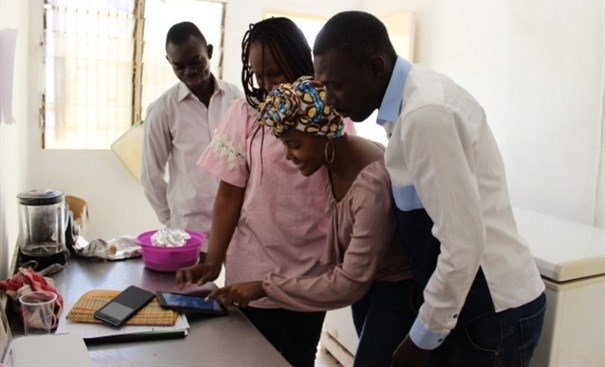Senegal's corner shops go digital to track trade

Amadou Bawol Bah, like many owners of the corner "boutiques" in Senegal, used to have a large ledger he filled in each day with purchases and credit offered to his customers. "One day I was filling in some details and some cooking oil tipped onto the ledger," he recalled of the moment in 2015 that wiped out years of careful bookkeeping.
Bawol Bah's disaster became the inspiration for a locally-designed app called 'Weebi', meaning "easy" in the local Pulaar language, and the trader hasn't looked back since downloading it. "Weebi simplifies sales and my invoices. The tablet and smartphone replace the notebook and pen," explained Weebi's co-founder Cheikh Sene, who began his start-up with two other Senegalese and a Frenchman. A micro-printer for receipts completes the mix, Sene added.
Around half of Senegal's registered businesses are one-man traders like Bawol Bah, according to government statistics, and operate at thin margins with clients often reliant on credit paid back at the end of the month. In the case of accidents like Bawol Bah's, the app comes with confidential backup for each user, according to Weebi, so data remains safe in case of loss or damage to a device.
After winning a prize for digital innovation at the Africa-France summit held in Bamako in January, Weebi's ambitions are growing in the capital. Although just 40 users so far have the app, which is a standalone download or can be bought for 118,000 FCFA ($200) preloaded onto a tablet, 300 clients have shown an interest in the product in the Dakar area.
Marieme Assietou Diagne, who manages a health food delivery business, says she has gained "more free time and better sales" since using the software. "It helps us to follow clients - who are the regulars, the number of orders, and how many meals we are selling per day," she told AFP. "We can reward loyal customers at the end of the month."
Other small business owners have begun using 'Somtou', a console launched in May with an interface specifically designed for Senegal's majority illiterate population that works with icons and voice commands.
The upstart costs of buying a laptop and the electricity required to run it all day are prohibitive for most, and training in accountancy programmes or software such as Microsoft Excel hard to come by without paying for classes.
With sturdy casing and bright graphics, Somtou is aimed squarely at market traders and small businesses, said its Cameroonian creator Ted Boulou. "It allows those in the informal sector to manage their work more effectively, and gives them more precise estimates of income, revenue and clients," Boulou said.
That can empower them to better bargain wholesale costs and promotions, making businesses more effective, he added, while filing of tax returns and other government documents became simpler and more accurate.
Pricing is also flexible for clients without much upfront cash. "Some will pay 13,000 FCFA ($22) per month for two years, or 500 FCFA (85 cents) a day for two years," Boulou explained, as the single payment of 275,000 FCFA was prohibitive for many - and he has taken 100 orders.
Source: AFP
Source: I-Net Bridge

For more than two decades, I-Net Bridge has been one of South Africa’s preferred electronic providers of innovative solutions, data of the highest calibre, reliable platforms and excellent supporting systems. Our products include workstations, web applications and data feeds packaged with in-depth news and powerful analytical tools empowering clients to make meaningful decisions.
We pride ourselves on our wide variety of in-house skills, encompassing multiple platforms and applications. These skills enable us to not only function as a first class facility, but also design, implement and support all our client needs at a level that confirms I-Net Bridge a leader in its field.
Go to: http://www.inet.co.za





